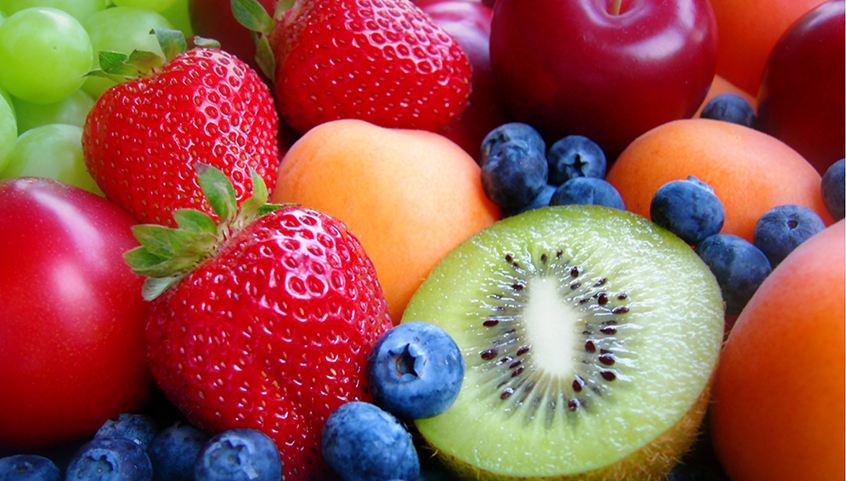Fruit contains fructose – which is fruit’s form of sugar. And, while sugar has earned a bad reputation for being a primary contributor to obesity, the truth is that your body does need a certain amount of sugar and one could argue that fruit provides the healthiest option.
Ultimately, the sugars provided in fruit are not “bad for you” but like with anything – moderation is the key.
Even with the healthy version of fructose offered in fruits – if you do not manage your blood sugar levels effectively it can be detrimental to your body weight and body fat!
How Much Fruit Can You Eat…
According to www.nhs.uk sugar should make up no more than 10% of your overall energy / calorie intake per day. As a rule of thumb the average person can handle up to 5 grams of fructose a day. This is approximately 1 piece of fruit – eg. an apple.
An athlete on the other hand – can handle up to 30 grams of fructose a day, which is approximately 5 pieces of fruit. This is because their metabolic output is higher and they are likely more carb tolerant & insulin sensitive than the average person.
Keep in mind that drinking fruit juice is the equivalent of eating a piece of fruit (or many peices). You‘re still consuming fructose within that fruit – ½ a cup of fruit juice is equal to one fruit serving.
Fruity Effects…
Once a fruit is juiced, its Glycemic Index goes way up (GI = indicates how fast certain foods are absorbed into your bloodstream). The longer the fruit has been juiced the higher the GI, and, the higher the GI of a food the more challenging it is for your body to maintain a steady blood sugar level – depending on the time of the feeding.
For instance, a high carb meal straight after training is a smarter time to eat that type of food because at that point you utilise the carb energy more efficiently.
A high carb meal for breakfast is not so smart, so fruit in the morning is also not a good idea because your blood sugar level will rise which means your pancreas will secrete insulin to re-balance you blood sugar level.
Approximately 2 hours later, this secretion of insulin means you will experience an ‘energy crash’ and require copious amounts of caffeine to keep you awake!
When To Eat Fruit…
Choose to eat your fruit at the right time – as a snack and on its own.
The body uses different enzymes when it digests fruit than when it digests other foods. It also takes time for your body to completely absorb the simple fructose sugars found in fruit.
Top tip: eating fruit on an empty stomach allows the body to perform this special process more easily and more effectively.
A good time to eat a piece of fruit is before a thorough training session. Your body will tap into the energy provided by the fruit during your workout! Around 30 minutes beforehand should do it.
All Fruits Are Not Made Equal…
Ever heard of GI? GI stands for Glycemic Index which is a system that ranks food on a scale of 1 to 100 based on their effect on blood sugar levels.
The lower the GI of the fruit the easier you will find it to manage your blood sugar. Therefore it’s important that you choose your fruit wisely.
Below is a list of fruits that are lower on the Glycemic Index:
Food |
GI Value |
| Cherries | 22 |
| Grapefruit | 25 |
| Prunes | 29 |
| Dried Apricots | 30 |
| Apple | 38 |
| Pear | 38 |
| Plum | 39 |
| Strawberries | 40 |
| Orange, Navel | 42 |
| Peach | 42 |
| Grapes | 46 |
| Mango | 51 |
| Banana | 52 |
Rotate your fruits from the list of low GI options to gain a wider selection of different vitamins & minerals contained within each fruit.
Goes Without Saying…
Always eat Organic whenever you can – this simply means free from chemical sprays. Commercial farming uses a rainbow of crop sprays to stimulate the highest yield possible, so reduce your intake of the unseen toxins we take into our body where possible by buying organic food.
Organic food can cost a little bit extra, but it is always worth investing in yourself.
Bottom Of The Barrel…
The bottom line is: Fruit is not bad for you. In fact, natural sugars are an important part of a healthy diet.
But there is such thing as ‘too much of a good thing’. Fruit can hinder your body fat loss if you over consume or eat the wrong type of fruit at the wrong time.
Remember that moderation is the key, so stick to the fruits lower down the GI score list provided above.
Rotate them & try to time your 1 piece of fruit daily intake so that it is eaten alone & on an empty stomach – ideally before or after a training session.












